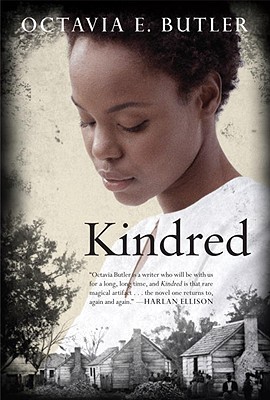Kindred
Kindred takes place in 1976 and in 1815. Dana a young African-American woman
periodically experiences dizziness and black outs which enable her to go back in time to 1815. The experience of going back to the slave days is shocking and terrible for her in the beginning. She is extremely distressed since she has no idea how this happens. Divided between the fear of having to live life as a slave and helping Rufus, who she saves from drowning on her first trip, she is driven down a perilous journey of truth about her family and herself that will change her and her husband Kevin forever.
 Kindred reads as a historical fiction novel with a twist of science-fictional time traveling. I never thought these two could work so well in a novel but they do. The novel is written in a simple style, and reads very quickly. However, Butler delves deeply into themes like race, violence, family, and home in a manner that is quite intense . In addition, she explores the theme of power and how it can become a corrupt tool of influence and cruel manipulation.
Kindred reads as a historical fiction novel with a twist of science-fictional time traveling. I never thought these two could work so well in a novel but they do. The novel is written in a simple style, and reads very quickly. However, Butler delves deeply into themes like race, violence, family, and home in a manner that is quite intense . In addition, she explores the theme of power and how it can become a corrupt tool of influence and cruel manipulation.
The first quarter of the book we are trying to understand like Dana, how and why this is happening. Unfortunately, that is never really addressed, so quickly what will happen to Dana and how she relates to all the different people on the plantation becomes the primary plot of the novel. Things get messier when Kevin, her white husband grabs on to her and winds up back in slavery times with her. The awkwardness of the situation is frightening. There Butler makes Dana and Kevin face this difficulty head on like a slap in the face. The mounting tension and horrific violence from whippings, rapes, hangings, and dog attacks, Butler is forcing the reader to see the reality of the time period along with Dana. Many times I kept putting myself in Dana’s shoes and wondering how I’d react.
Dana was a trooper in the beginning trying to think of everything and to prepare for things, but what she didn’t realise is that she fell slowly but surely into the role of a sort of modern-day Mamie. She is bound to the past not only physically but mentally since she seems unable to break the link between herself and Rufus. We see Rufus grow from and innocent boy into an unsparing, conniving man. A man who is meant to run a plantation although he does it through being cruel and by making people fear him. Dana finally grows at the end with much difficulty and mostly because she feels she understands what she sees happening in 1815 more than she really does. The trap is there. The psychological manipulation that Rufus uses on her his criminal.
If you haven’t read this story you should definitely check it out. Octavia E. Butler really knew how to turn a story and this one has many twists and turns that will make every reader think. Butler began writing at 10 and writing science-fiction at 12. Her love for writing came out of her boredom for she was an only child. It was the science-fiction movie Devil Girl from Mars which made her attempt to write science-fiction. She was quoted as saying she knew she could write a better story and that she did. Happily for us, Butler overcame dyslexia and went on to write many novels and short stories, such as Fledgling, Lilith’s Brood, and Parable Seed. She won the Hugo Award twice, once in 1984 for best short story with Speech Sounds and in 1985 for best novelette with Bloodchild. She also won the Nebula award twice for best novel, once for best short story, and best novelette. In 2010, she was inducted into the Science Fiction Hall of Fame. Does it sound like I’m pushing Butler? Yes, I am. Well the next Butler book I’ll be picking up will be Fledgling. I’m dying to see how she wrote about vampires and I’m not that keen on vampire stories either. To be continued…..
 6
6
 11
11











